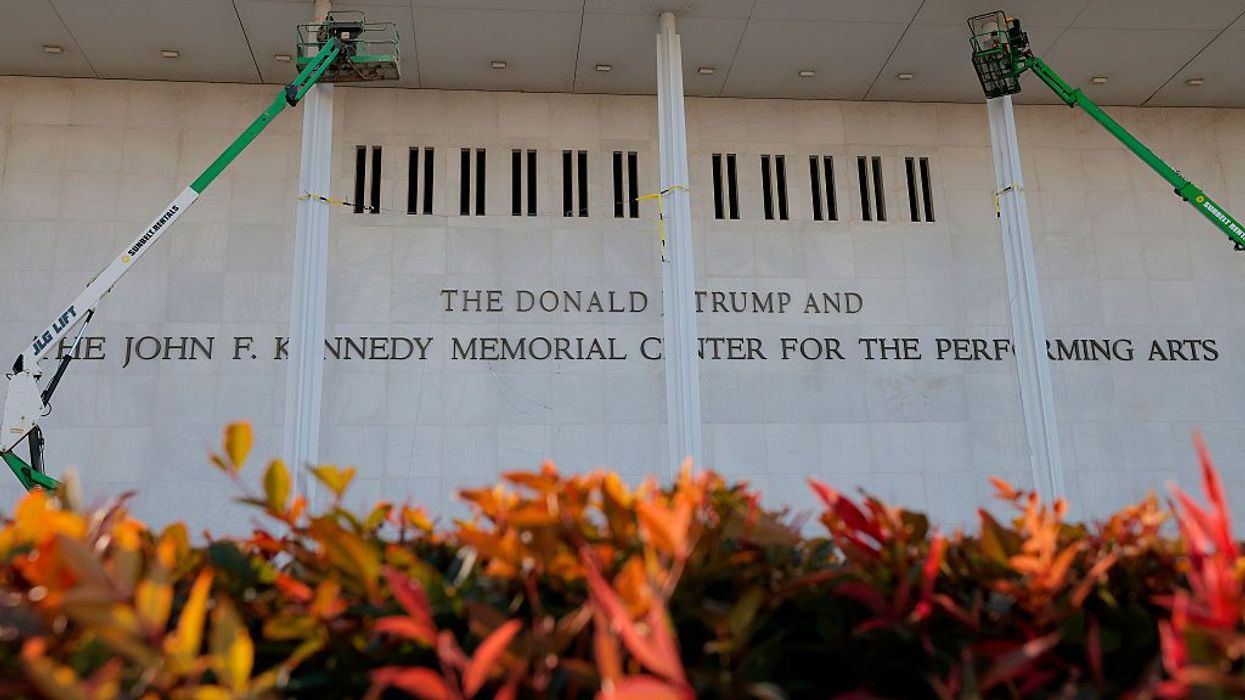January, 21 2015, 10:45am EDT

Five Years After Citizens United: We Need a Constitutional Amendment More Than Ever
U.S. Supreme Court Ruling Brought Out-of-Control Spending, Super PACs, Dark Money Groups
WASHINGTON
Voices across the country are decrying the U.S. Supreme Court's controversial Citizens United decision today at rallies, marches, movie showings and lobby days to mark the ruling's fifth anniversary.
The nationwide events highlight growing momentum for a constitutional amendment to overturn Citizens United, which gave corporations and the wealthy the green light to spend unlimited sums to influence elections.
Events included a rally in a downtown park in Washington, D.C., to highlight the biggest dark money spender in the 2014 midterms - the U.S. Chamber of Commerce; a press conference on Capitol Hill in which more than a dozen congressional lawmakers introduced measures designed to curb the influence of money in politics; lobby days in Albany, N.Y., and Olympia, Wash.; and a march in New Hampshire. Other events included showings of the movie "Pay 2 Play" in Tulsa, Okla., and Tucson, Ariz.; a rally at the Savannah, Ga., Chamber of Commerce and a house party in Savage, Minn.
"The American people understand the corruption of the political system and its consequences," said Robert Weissman, president of Public Citizen, which has been pushing for five years for an amendment to overturn Citizens United and spearheaded the Washington, D.C., rally. "Five years after the Supreme Court handed down the abomination known as Citizens United, we know that our country will not be able to address the great challenges it faces - from putting people to work and raising wages to providing health care to all, from reducing wealth inequality to averting catastrophic climate change, and much more - without ending corporate and super-rich dominance of our elections."
Here's what five years since the court ruling has brought:
- Record spending in elections - $4 billion on the 2014 midterms.
- The advent of super PACs, which can raise unlimited sums of money from corporations, unions, associations and individuals.
- The use of dark money groups - trade associations and nonprofit groups set up to funnel money into elections without having to disclose their donors.
- An increase in the use of super PACs and other groups to support a single candidate. Single-candidate super PACs represented 45 percent of all super PACs that spent at least $100,000 during the 2014 election cycle.
- A dramatic increase in the amount of spending by groups not affiliated with campaigns. In 80 percent of competitive 2014 races, outside spenders outspent the candidates -- sometimes by more than double.
Citizens United also brought a positive thing: a grassroots movement that is sweeping the country, demanding the court ruling be overturned with a constitutional amendment. Multiple polls show that the problem of money in politics now is a hot-button issue.
"Americans realize that money in politics is corrosive to democracy, that it enables corporations and the wealthy to drown out the voices of ordinary citizens and makes elected officials more beholden than ever to the outside interests that helped get them elected," Weissman said. Consider:
- Fifty-four U.S. senators voted in the fall to support an amendment.
- More than 5 million people have signed petitions supporting an amendment.
- Sixteen states (PDF) (California, Colorado, Connecticut, Delaware, Hawaii, Illinois, Maine, Maryland, Massachusetts, Montana, New Jersey, New Mexico, Oregon, Rhode Island, Vermont and West Virginia) and the District of Columbia have supported a constitutional amendment. To indicate support, state legislatures either approved a resolution or signed a letter, or voters approved a ballot measure.
- More than 600 cities and towns have backed an amendment.
The constitutional amendment considered last year by the Senate would enable the government to pass laws ending corporate spending on elections, eliminating or curbing outside donations, imposing limits on overall election spending and adopting mandatory systems of small-donor and public financing.
Rallies around the country
Here are some of the key rallies on Jan. 21:
- Washington, D.C.: Hundreds will rally in the park between the White House and the U.S. Chamber of Commerce to shine a light on the fact that the Chamber is the biggest secret spender in elections. Speakers will explain how corporate political spending influences a range of issues that affect Americans.
- Albany, New York: Hundreds will rally at the state Capitol and call for New York to support an amendment.
- Augusta, Maine: Hundreds will deliver more than 80,000 petition signatures needed to qualify a clean elections initiative for the ballot.
- Los Angeles: Activists will participate in a March for Democracy from Los Angeles City Hall to the Los Angeles Chamber of Commerce and drop a banner over the 110 Freeway at rush hour.
- New York City: The makers of the Pay 2 Play documentary will unravel their street-sized Monopoly board at 3:30 p.m. in front of the New York Stock Exchange.
- San Francisco: A march for democracy will be kicked off by the inspirational Khafre Jay, a hiphop artist for change. Speakers at the rally include Tom Ammiano, San Francisco's inspirational, progressive leader; Gayle McLaughlin, former Richmond mayor who stood up to Chevron and won; David Braun, with Californians Against Fracking; and Bill McKibben, co-founder of 350.org.
- Olympia, Washington: Citizens will hold a lobby day to call for Washington state to support a constitutional amendment to overturn Citizens United.
"A constitutional amendment would help to guard the First Amendment rights of all American citizens to be heard in our elections and in government overall," Weissman said. We urge policymakers to support a constitutional amendment to reestablish the core meaning of democracy: rule by the people."
Public Citizen is a nonprofit consumer advocacy organization that champions the public interest in the halls of power. We defend democracy, resist corporate power and work to ensure that government works for the people - not for big corporations. Founded in 1971, we now have 500,000 members and supporters throughout the country.
(202) 588-1000LATEST NEWS
All UN Security Council Members Except US Join Somalia in Condemning Israel's Recognition of Somaliland
Somalia's UN ambassador said Israel plans to “relocate the Palestinian population from Gaza to the northwestern region of Somalia," and warned that "this utter disdain for law and morality must be stopped now."
Dec 30, 2025
At an emergency meeting of the United Nations Security Council on Monday regarding Israel's recognition of the breakaway region of Somaliland, 14 of 15 member states joined Somalia's permanent representative to the UN in condemning what the ambassador called an “act of aggression"—and at least one denounced the Trump administration's defense of Israel's move.
The emergency summit was called days after Israel announced its formal recognition of the region, which declared independence in 1991 after a civil war, but which has not been acknowledged by any other country. Somalia continues to claim Somaliland as part of the country while the region's leaders say the state is the successor to the former British protectorate.
Israel announced its decision months after Prime Minister Benjamin Netanyahu spoke with leaders in Somaliland about a potential deal to trade formal recognition of the region for help with illegally deporting Palestinians from Gaza, and as Israeli policy advisers have argued that Somaliland could be used as a base for military operations against the Houthis in Yemen.
Despite evidence that Israel formally acknowledged Somaliland to further its own military and territorial interests, Israeli Deputy Permanent Representative Jonathan Miller arrived at the meeting Monday with the aim of explaining the "historical context" for the country's decision.
"Entire cities were destroyed," said Miller. "Civilians were deliberately targeted. These crimes are now widely recognized as a genocide... Israel's then-acting permanent representative, Yohanan Bein, submitted this letter to this very council warning of grave human rights violations in Somalia... That history provides essential context for the discussion surrounding Israel's recognition of Somaliland today."
Abukar Dahir Osman, Somalia's permanent representative to the UN, suggested Miller's comments only added insult to injury, considering Israel has been assaulting Gaza for more than two years—with attacks continuing despite a "ceasefire"—and has killed more than 71,000 Palestinians in what numerous human rights groups and experts have called a genocide.
"If we want to talk about genocide, it's Israel that's committed this to our own eyes every day," said Osman. "[Miller] represents a government that killed more than 70,000 people. Civilians, including children, women, elderly, doctors and other health workers, and patients in hospitals. Destroying infrastructures, deliberately starving people of Gaza."
“To come to this place, and lecture us [on] humanity and genocide and human rights and independence and democracy. And we know what you’re doing on a daily basis," said Osman. "It’s just an insult.”
Somalia’s representative at the United Nations had a history lesson to share with Israel’s envoy today. “To come to this place, and lecture us [on] humanity & genocide & human rights & independence & democracy. And we know what you’re doing on a daily basis. It’s just an insult.” pic.twitter.com/dcg3NnGKI4
— Drop Site (@DropSiteNews) December 30, 2025
Warning that the recognition of the breakaway region could destabilize Somalia as well as the broader Horn of Africa, the ambassador also expressed concern that Israel plans to “relocate the Palestinian population from Gaza to the northwestern region of Somalia."
"This utter disdain for law and morality must be stopped now,” said Osman.
Other representatives expressed similar outrage, with the UN envoy for the 22-member Arab League, Maged Abdelfattah Abdelaziz, saying the group would reject “any measures arising from this illegitimate recognition aimed at facilitating forced displacement of the Palestinian people, or exploiting northern Somali ports to establish military bases."
Muhammad Usman Iqbal Jadoon, deputy UN ambassador for Pakistan, said Israel's move following its previous comments on potentially deporting Palestinians to Somaliland was "deeply troubling."
Tammy Bruce, who was sworn in Monday as deputy US representative to the United Nations, was alone in backing Israel's recognition of Somaliland, though she noted that US policy on the region has not changed.
"Israel has the same right to conduct diplomatic relations as any other sovereign state," said Bruce. "Earlier this year, several countries, including members of this council, made the unilateral decision to recognize a nonexistent Palestinian state. And yet, no emergency meeting was called to express this council’s outrage."
More than 150 countries, including a number of major US allies, have recognized Palestinian statehood, with nearly two dozen governments announcing their recognition since Israel began its assault on Gaza in 2023.
Samuel Zbogar, Slovenia's UN ambassador, pushed back against Bruce's comparison.
"Slovenia recognized Palestine as an independent state," he said. "We did so in response to undeniable right of Palestinian people to self-determination. Palestine is not part of any state. It is an illegally occupied territory as declared by the [International Court of Justice], among others. Palestine is also an observer state in this organization."
"Somaliland, on the other hand, is part of a UN member state and recognizing it goes against Article 2, paragraph 4 of the UN Charter," he said.
On Tuesday, protests erupted in cities across Somalia, including the capital of Mogadishu, with demonstrators calling for national unity.
Keep ReadingShow Less
Artists Cite Trump's 'Ego' and 'Overt Racism' While Canceling Kennedy Center Performances
"When American history starts getting treated like something you can ban, erase, rename, or rebrand for somebody else's ego, I can’t stand on that stage and sleep right at night," said folk singer Kristy Lee.
Dec 30, 2025
President Donald Trump's decision to slap his name on the side of the John F. Kennedy Center for the Performing Arts is not going over well with many of the artists scheduled to perform there.
Days after the annual Kennedy Center Christmas Eve jazz concert was canceled over performers' objections to the name change, more artists have decided to withdraw in protest over the president's actions, leading to the cancelation of New Year's Eve festivities at the center.
A Monday report from the Washington Post quoted saxophonist Billy Harper, a member of the jazz ensemble the Cookers that had been set to perform on New Year's Eve, as saying his group did not want to play in a venue that had been unofficially renamed after the current president.
"I would never even consider performing in a venue bearing a name... that represents overt racism and deliberate destruction of African American music and culture," said Harper. "After all the years I spent working with some of the greatest heroes of the anti-racism fight like Max Roach and Randy Weston and Rahsaan Roland Kirk and Stanley Cowell, I know they would be turning in their graves to see me stand on a stage under such circumstances and betray all we fought for, and sacrificed for."
The Cookers weren't the only artists to withdraw from a scheduled performance at the Kennedy Center, as the New York-based dance company Doug Varone and Dancers also announced Monday that they were withdrawing from April performances at the venue.
In a social media post announcing the cancelation, the company explicitly linked its decision to Trump's renaming of the building.
"With the latest act of Donald J. Trump renaming the Center after himself, we can no longer permit ourselves nor ask our audiences to step inside this once great institution," the company explained.
Doug Varone, the head of the company, told the New York Times that his decision to cancel the performance was "financially devastating but morally exhilarating," and he noted that the troupe was set to take a $40,000 hit from withdrawing.
Folk singer Kristy Lee last week also announced she would not be performing at a scheduled Kennedy Center show in January, even while acknowledging that doing so "hurts" her financially.
However, she emphasized that "losing my integrity would cost me more than any paycheck," and argued that "when American history starts getting treated like something you can ban, erase, rename, or rebrand for somebody else's ego, I can’t stand on that stage and sleep right at night."
Trump-appointed Kennedy Center chairman Richard Grenell has lashed out bitterly at artists for canceling their performances, and accused them of having "a form of derangement syndrome." Grenell has also threatened to sue the jazz musicians who withdrew from the Christmas Eve performance for $1 million in damages.
Keep ReadingShow Less
Many in Gaza to 'Lose Access to Critical Medical Care' as Israel Suspends Doctors Without Borders
"The humanitarian response in Gaza is already highly restricted, and cannot afford further dismantlement," the renowned organization warned.
Dec 30, 2025
The Israeli government said Tuesday that Doctors Without Borders, one of the largest medical organizations currently operating in Gaza, is among the 25 humanitarian groups that will be suspended at the start of the new year for their alleged failure to comply with Israel's widely criticized new registration rules for international NGOs.
According to the Associated Press, Israel's Ministry of Diaspora Affairs "said the organizations that will be banned on January 1 did not meet new requirements for sharing staff, funding, and operations information." The Israeli government specifically accused Doctors Without Borders, known internationally as Médecins Sans Frontières (MSF), of "failing to clarify the roles of some staff that Israel accused of cooperation with Hamas and other militant groups," AP reported.
In addition to providing medical assistance to desperate Palestinians, MSF has been an outspoken critic of what has it described as Israel's "campaign of total destruction" in Gaza. The group said in a report released last December that its teams' experiences on the ground in Gaza were "consistent with the descriptions provided by an increasing number of legal experts and organizations concluding that genocide is taking place."
Ahead of Tuesday's announcement, Doctors Without Borders warned that the looming withdrawal of registration from international NGOs "would prevent organizations, including MSF, from providing essential services to people in Gaza and the West Bank."
"With Gaza’s health system already destroyed, the loss of independent and experienced humanitarian organizations’ access to respond would be a disaster for Palestinians," the group said in a statement last week. "The humanitarian response in Gaza is already highly restricted, and cannot afford further dismantlement."
"If Israeli authorities revoke MSF’s access to Gaza in 2026, a large portion of people in Gaza will lose access to critical medical care, water, and lifesaving support," the group added. "MSF’s activities serve nearly half a million people in Gaza through our vital support to the destroyed health system. MSF continues to seek constructive engagement with Israeli authorities to continue its activities."
Pascale Coissard, MSF's emergency coordinator for Gaza, noted that "in the last year, MSF teams have treated hundreds of thousands of patients and delivered hundreds of millions of liters of water."
"MSF teams are trying to expand activities and support Gaza’s shattered health system," said Coissard. "In 2025 alone, we carried out almost 800,000 outpatient consultations and handled more than 100,000 trauma cases."
Israel's announcement came shortly after Prime Minister Benjamin Netanyahu met with US President Donald Trump in Florida, where both dodged questions about their supposed "peace plan" for Gaza after more than two years of relentless bombing. The Israeli military has been accused of violating an existing ceasefire agreement hundreds of times since it took effect in October.
Al Jazeera reported Tuesday that "Israeli forces have carried out strikes across the Gaza Strip as they continue with their near-daily violations of the ceasefire agreement, with Israel’s genocidal war on the besieged enclave continuing apace and displaced Palestinians enduring the destruction of their few remaining possessions in flooding brought about by heavy winter rains."
Keep ReadingShow Less
Most Popular


